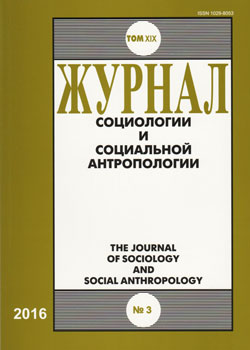Status Cultures, Biographic Cycles, and Generational Changes in Literary Tastes of Library Users in Saint-Petersburg
Keywords:
sociology of culture, sociology of arts, cultural consumption, cultural capital, Bourdieu, Big Data in social sciences
Abstract
The Saint Petersburg public library system accumulates information on attributes of library users (gender, age, education, occupation) as well as on books they take. In this paper, we analyze profiles of all readers who borrowed books by 200 most popular fiction authors in 2014 (taken overall 293319 times by 84003 unique readers). The data offers partial support to Bourdieu’s homology thesis: a system of tastes strongly correlated with the level of formal education attained and character of labour (manual/non-manual) exists, with Fowles being a typical representative of high-brow taste and various “male” and “female” detectives and “action fantasy” by Russian authors being examples of low-brow. However, the evidence available does not rule out possibility that the upper status culture is omnivorous. The effects of status culture cross-cuts effects of generational changes in tastes (sci-fi and fantasy succeeded detectives and mystery stories as the most popular genres) and interacts with gender effects (male-female polarization of tastes is evident in low-brow, but not in high-brow part of the status spectrum). We also observe stages of individual cultural careers: from literature for children (demonstrating some status polarization) to literature comprising the school program to further point of divergence in adult reading habits. Due to unusually rich data taken at the level of individual author, we can observe the shortcomings of a conventional genre classification as a tool for measuring “brow-level”: subgenres, rather than genres, polarize audience.
Published
2016-05-20
How to Cite
Sokolov, M., Sokolova, & Safonova. (2016). Status Cultures, Biographic Cycles, and Generational Changes in Literary Tastes of Library Users in Saint-Petersburg . ZHURNAL SOTSIOLOGII I SOTSIALNOY ANTROPOLOGII (The Journal of Sociology and Social Anthropology), 19(3), 116–135. Retrieved from http://jourssa.ru/jourssa/article/view/520
Section
Sociology of Culture

